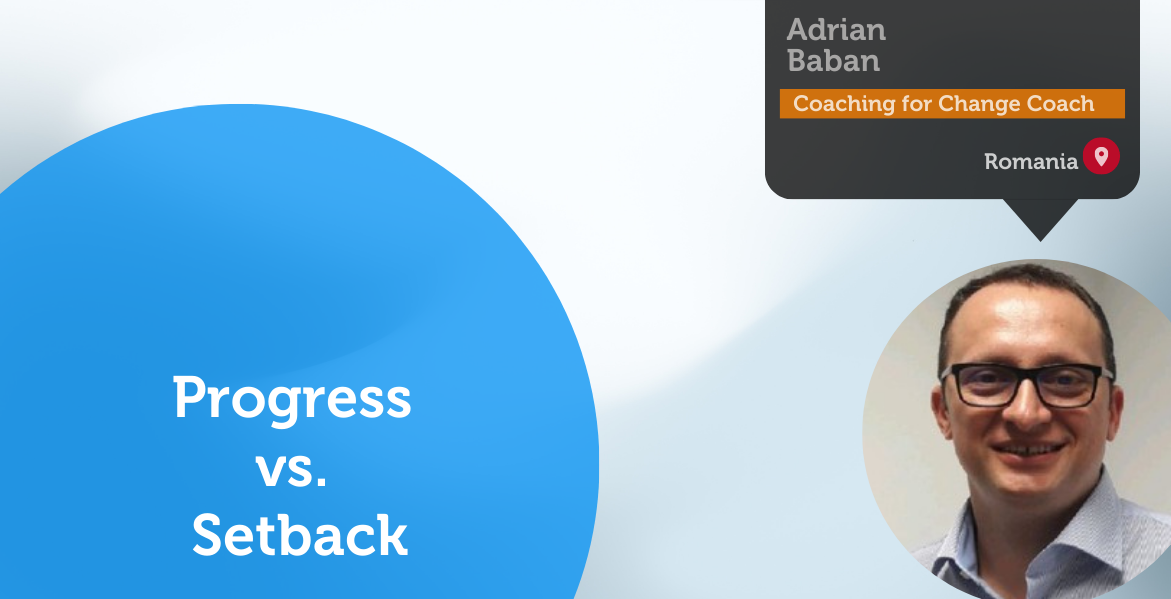A Coaching Power Tool By Adrian Baban, Coaching for Change Coach, ROMANIA

Progress vs. Setback Power Tool
The forward movement process in coaching towards a goal or objective encounter often setbacks that hinder our progress. Our awareness acknowledges that positive advancements play an important role during the lifespan of coaching.
We’ve all had to deal with setbacks at work or in our personal life. Setbacks can seem to block our progress moving forward. What differentiated us is how we approach and deal with them. The ability to bounce back from setbacks is often described as the difference between successful and unsuccessful people.
Progress vs. Setback Meaning
 Setbacks refer to temporary barriers or challenges that each of us may encounter during our life journey. Maybe we were passed over the promotion we wanted, lost an important colleague or client, or found our business is not taking off as quickly as we’d like. These can be frustrating and demotivating but are an inherent part of our development and continuous learning process.
Setbacks refer to temporary barriers or challenges that each of us may encounter during our life journey. Maybe we were passed over the promotion we wanted, lost an important colleague or client, or found our business is not taking off as quickly as we’d like. These can be frustrating and demotivating but are an inherent part of our development and continuous learning process.
Some common setbacks observed during my peer and observed coaching sessions include:
- Opposition to change. It is not uncommon for people to resist change, even when they intellectually understand its benefits. Defeating this resistance can be a setback that requires guidance and support.
- Stagnation comes in many forms. Maybe you’re burned out, you reached a plateau, and just stayed a little longer with that satisfying feeling of accomplishment. Sometimes we may feel like we are not making the desired progress or that our efforts are not giving the expected results. This perception can be discouraging and may require a reassessment of goals and strategies.
- External factors. New circumstances beyond our control such as unforeseen events or organizational changes can create setbacks as well. These circumstances may disrupt progress temporarily but can be navigated with resilience and adaptability. Whatever the reason, if left unchecked, external factors can cripple a business and throw all your goals off track.
- Emotional challenges. Coaching often goes into deep-rooted beliefs, emotions, and behavioral patterns. Exploring these aspects can sometimes trigger emotional challenges or discomfort. Also, sometimes the limitation of the language may influence the coaching interaction when discussing emotions, leading to unhelpful results. It is important in the coaching process to address and acknowledge these setbacks as part of the growth journey.
It’s important to acknowledge that setbacks are not indicative of failure but rather opportunities for learning, adjustments, and renewed efforts.
On the opposite side progress in coaching refers to the positive energy, self-awareness, and achievements made by the individual being coached. It signifies growth, development, and improvement in various aspects of our life.
Progress can be observed in different ways, including:
- Self-awareness. During the coaching process, we often foster self-reflection and deepened self-awareness, by building a better understanding of ourselves and viewing our own actions/reaction objectively. As individuals, we are gaining insights about our strengths, weaknesses, values, and beliefs that can make positive changes and experience personal growth.
- Confidence. As we are making progress during the coaching journey we gain confidence in our abilities, leading to a greater willingness to take on new challenges and pursue our aspirations. When you acquire inner confidence and happiness you can become your own dance.
- Enhanced relationship. Interpersonal skills, communication, and empathy improve our understanding and foster better relationships with colleagues, friends, family, and others.
- Goal attainment. We acquire new skills or improve the existing ones through coaching once we are embracing progress, leading to increased competence and effectiveness in our field area. The process facilitates setting and achieving specific goals, whether personal or professional, and progress is evident when these are met or surpassed.
Understanding setbacks in their various forms and choosing to embrace progress in our personal and professional day-to-day life represents a key component to achieving success. When you can do this, you will realize that you are able to shift your energy from feeling heavy to being positive and empowering.